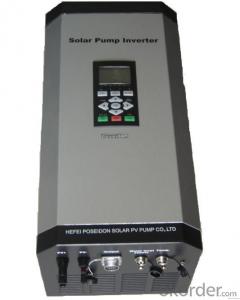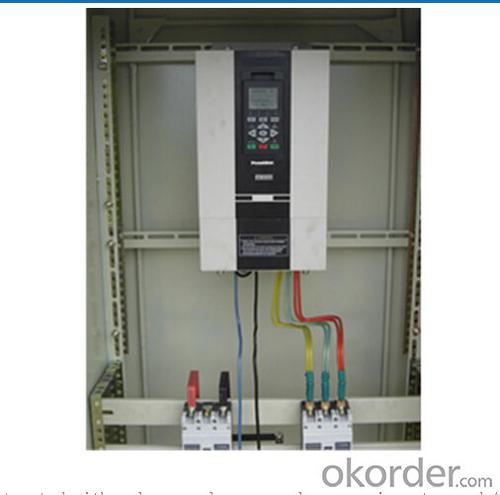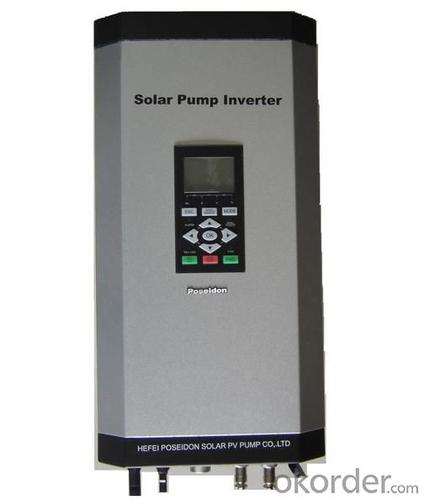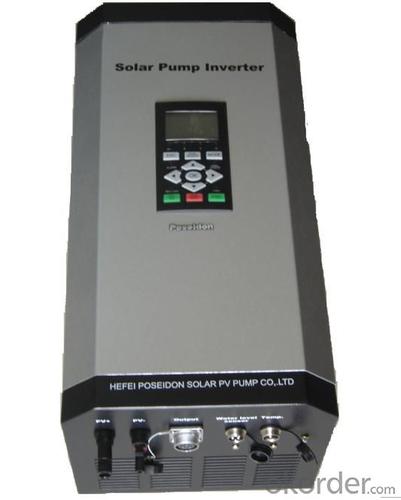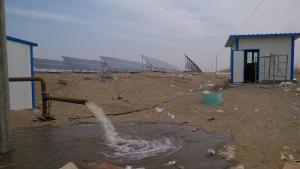Dankoff Solar Pump FCPM37KH Inverter
- Loading Port:
- China Main Port
- Payment Terms:
- TT OR LC
- Min Order Qty:
- -
- Supply Capability:
- -
OKorder Service Pledge
Quality Product, Order Online Tracking, Timely Delivery
OKorder Financial Service
Credit Rating, Credit Services, Credit Purchasing
You Might Also Like
Solar pump inverter FCPM37KH Product Description:
Solar water pumping system is constructed with solar panel array,solar pump inverter and AC water pump, DC current produced from solar panel will be delivered to solar pump inverter,and it will convert it into AC current to drive water pump,and will automatically regulate output frequency according to sun radiance intensity,maximally realize MPPT tracking function.
Features
Adopting the proposed dynamic VI maximum power point tracking (MPPT) control method, with fast response, and reliable operation, achieves efficiency of 99%.
Designed with variable frequency driver, greatly improves efficiency
Extremely high efficiency
Digital mode control, with automatic operation and manual operation mode options
Complete protection functions
Adopts intelligent IPM module, with high reliability
LCD display and operation panel, in real time presents operating data
Optional for water level measurement and control circuit
Applicable for general ACC pumps, like centrifugal pump, piston pump etc.
Independent intellectual property; Highly effective, the redundant reliability, exempts the maintenance and the long life.
The pumps are soft started, fully protected.
No batteries are used. So better Sunlight, more water.
Datasheet.
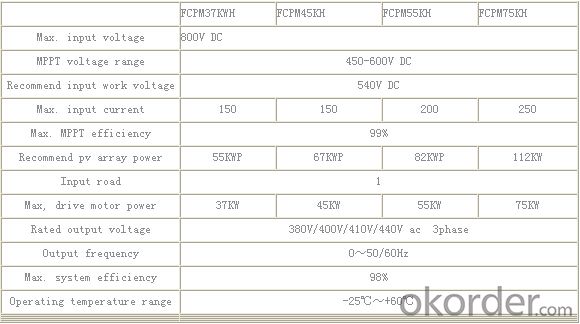
- Q: Are there any water quality requirements for a solar pump?
- Yes, there are water quality requirements for a solar pump. The specific requirements may vary depending on the type and design of the solar pump, as well as the intended use of the pumped water. However, in general, the water quality should meet certain standards to ensure the efficient and safe operation of the pump. One important requirement is that the water should be relatively clean and free from excessive sediment, debris, or large particles. This is because such impurities can clog or damage the pump, reducing its efficiency and lifespan. Additionally, if the solar pump is used for irrigation purposes, for example, the water should not contain high levels of contaminants, such as salts, chemicals, or heavy metals, which may harm plants or crops. Furthermore, the water quality should also be suitable for the specific type of solar pump being used. For instance, if the pump includes a submersible motor, the water should be free from corrosive substances that may damage the motor components. Similarly, if the pump uses a filtration system, the water quality should not exceed the maximum allowable levels for the filter's capacity to effectively remove impurities. It is important to consult the manufacturer's guidelines and specifications for the solar pump being used to determine the specific water quality requirements. Additionally, conducting periodic water testing and maintenance can help ensure that the pump operates optimally and remains in good condition.
- Q: How does the size of the pump motor affect the performance of a solar pump?
- Determining the performance of a solar pump heavily relies on the size of the pump motor. The flow rate, pressure, and overall efficiency of the pump are directly influenced by the motor size. When the pump motor is larger, it enables a higher flow rate, resulting in the ability to pump more water within a given time period. This is particularly important in scenarios where a substantial amount of water needs to be transported, such as in agricultural irrigation or large-scale water supply systems. A higher flow rate guarantees the effective and efficient delivery of the desired volume of water. Moreover, the size of the pump motor impacts the pump's ability to generate pressure. A larger motor is capable of creating higher pressure, which becomes necessary when pumping water to elevated areas or overcoming resistance in an extensive pipe network. The increased pressure ensures that water reaches its intended destination with sufficient force and can be evenly distributed across the irrigation system or other applications. Furthermore, a larger motor often leads to improved efficiency. With a more powerful motor, the pump requires less time to complete its pumping cycle, resulting in reduced energy consumption. This not only saves costs but also promotes a more sustainable utilization of solar energy. It is important to note that while a larger motor generally offers better performance, it also demands more energy to operate. Therefore, it is crucial to find a balance between motor size and energy availability. If the solar array providing power to the pump cannot generate enough electricity to operate a larger motor, it may be necessary to opt for a smaller motor that can still meet the required performance levels without exceeding the available energy supply. To conclude, the size of the pump motor significantly impacts the performance of a solar pump. A larger motor allows for higher flow rates, increased pressure, and improved efficiency. However, it is essential to consider the available energy supply when selecting the motor size to ensure optimal performance and energy utilization.
- Q: Are solar pumps suitable for all types of water sources?
- No, solar pumps may not be suitable for all types of water sources. The suitability of solar pumps depends on various factors such as the depth of the water source, the quality of water, and the required flow rate. It is important to assess these factors before determining if a solar pump is suitable for a particular water source.
- Q: Can a solar pump be used for irrigation in arid regions?
- Yes, a solar pump can definitely be used for irrigation in arid regions. Since arid regions receive abundant sunlight, solar pumps can efficiently harness solar energy to power water pumps, providing a sustainable and cost-effective solution for irrigation. These pumps can draw water from various sources like wells, rivers, or underground reservoirs, and distribute it to the fields, enabling farmers to irrigate their crops even in water-scarce areas. Solar pumps offer a reliable and environmentally friendly alternative to traditional diesel or electric pumps, making them well-suited for irrigation in arid regions.
- Q: How does a solar pump handle voltage variations in different countries?
- A solar pump typically handles voltage variations in different countries through its built-in voltage regulation system. This system ensures that the pump receives a consistent and appropriate voltage level, regardless of the variations in the local power supply. It can automatically adjust the voltage to match the requirements of the pump, ensuring optimal performance and preventing any damage due to voltage fluctuations.
- Q: Can a solar pump operate during power outages?
- Yes, a solar pump can operate during power outages. Unlike traditional pumps that rely on electricity from the grid, solar pumps are powered by solar panels that convert sunlight into energy. This means that as long as there is sunlight available, the solar pump will continue to operate and supply water. This makes solar pumps a reliable and sustainable solution in areas with frequent power outages or limited access to electricity. Additionally, some solar pumps are equipped with batteries or storage systems, allowing them to store excess energy generated during the day and continue operating at night or during cloudy weather, further ensuring uninterrupted water supply even in the absence of sunlight.
- Q: How reliable are solar pumps?
- Solar pumps have proven to be highly reliable in various applications. The reliability of solar pumps depends on several factors such as the quality of the equipment, proper installation, and regular maintenance. High-quality solar pumps manufactured by reputable companies are designed to be durable and withstand harsh weather conditions. They are often made from corrosion-resistant materials and are built to last for many years. Additionally, these pumps are equipped with advanced technologies such as MPPT (Maximum Power Point Tracking) controllers, which maximize the efficiency and performance of the system. Proper installation is crucial for the reliability of solar pumps. It is important to ensure that the pump is correctly sized and installed in an optimal location with adequate sunlight exposure. Additionally, proper wiring and connections are essential to prevent any electrical issues that may affect the pump's performance. Regular maintenance is also necessary to ensure the long-term reliability of solar pumps. This includes cleaning the solar panels to maximize their efficiency, checking the pump's performance, and inspecting the system for any potential issues. By conducting regular maintenance, any problems can be identified and addressed promptly, minimizing downtime and maximizing the reliability of the pump. Overall, solar pumps have proven to be a reliable and sustainable solution for various water pumping needs. When installed and maintained properly, they can provide a consistent and efficient water supply, even in remote locations where access to grid electricity is limited.
- Q: Can a solar pump be used in areas with high levels of dissolved minerals in water?
- Yes, a solar pump can be used in areas with high levels of dissolved minerals in water. Solar pumps are designed to operate with various water sources, including those with high mineral content. However, it is important to regularly monitor and maintain the pump to prevent any potential clogging or damage caused by mineral deposits.
- Q: Can a solar pump be used for groundwater extraction?
- Yes, a solar pump can be used for groundwater extraction. Solar pumps are capable of efficiently extracting water from underground sources, such as wells or boreholes, using solar energy as the power source. They are often used in areas where access to electricity is limited or unreliable, providing a sustainable and cost-effective solution for groundwater extraction.
- Q: Are there any safety concerns with using a solar pump?
- Yes, there are potential safety concerns with using a solar pump. These concerns include electrical hazards, such as the risk of electric shock or fire if the wiring or connections are not properly installed or maintained. Additionally, there may be safety concerns associated with the pump's physical components, such as the risk of injury from moving parts or the need for proper maintenance to ensure safe operation. It is important to follow the manufacturer's instructions and seek professional assistance if needed to mitigate these safety risks when using a solar pump.
Send your message to us
Dankoff Solar Pump FCPM37KH Inverter
- Loading Port:
- China Main Port
- Payment Terms:
- TT OR LC
- Min Order Qty:
- -
- Supply Capability:
- -
OKorder Service Pledge
Quality Product, Order Online Tracking, Timely Delivery
OKorder Financial Service
Credit Rating, Credit Services, Credit Purchasing
Similar products
Hot products
Hot Searches
Related keywords


